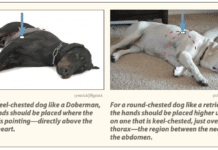Q: I have just gotten a Great Dane puppy, eight weeks old, and the vet said I should feed her food for large-breed puppies because it has less calcium for its calories than food for smaller puppies. I said, “You mean more calcium, right?” because a big dog like a Great Dane needs more calcium to build bigger bones. But the vet insisted that food for large-breed puppies has less calcium. How can that be?
Michelle Krivetsky
Riverdale, New York
Dear Ms. Krivestsky,
A: It might seem counterintuitive, but your dog’s veterinarian is right. Large-breed puppies require diets with less calcium per calorie than puppies who will grow to small or medium size. Their bodies can’t adapt their bone growth to how much calcium is absorbed from food as well as the bodies of smaller dogs. And if they have too much of that mineral, research has shown, they’re more likely to end up with skeletal problems down the line in the form of developmental bone disease. The bones in their bodies could grow too fast, become too thick, or even too thin, and those complications predispose a young dog to conditions like arthritis, hip and elbow dysplasia and other kinds of joint and bone problems down the line.
What constitutes a large-breed puppy? Officially, by pet food regulation standards, one who will grow to at least 70 pounds, but many veterinarians would say greater than 50 pounds. Your Great Dane is definitely in the “large” category either way.
Fortunately, the Association of American Feed Control Officials (AAFCO) has instituted a new rule for the wording on dog food packages that will make it easier to choose the right kibble depending on your pet’s size. If the food is stated on the label to be for “growth” (meaning it’s for puppies only) or “all life stages” (meaning it’s for all dogs, including puppies), the fine print of the Statement of Nutritional Adequacy (which is legally required to be on every bag or can) has to include one or the other of the following two phrases:
“including growth of large size dogs (70 lbs or more as an adult)”
“except for growth of large size dogs (70 pounds or more as an adult)”
Choosing the first one for your dog (all pet food manufacturers will have to be in compliance with the new labeling rules by next year) means the food will contain about 4.5 grams of calcium per 1,000 calories. The second one could contain food with as much as 6.25 grams of calcium for every 1,000 calories — about a 50 percent difference and enough to cause serious problems in susceptible breeds. Keep in mind that because these new standards are not yet mandatory, not every food you look at will contain the new wording. If the food doesn’t, then you should select a product that is specifically labeled “large breed puppy.” Your veterinarian can suggest some reputable brands if you need help.
Giant-breed dogs like Great Danes, as opposed to simply large dogs like Labrador retrievers, should be fed puppy food for up to the first 18 months of life, as opposed to the usual 12.




